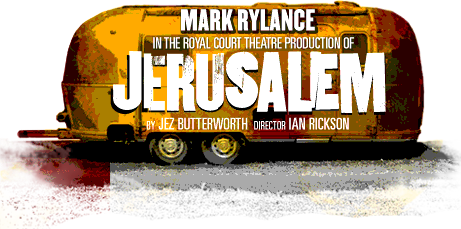Financial Times
By Sarah Hemming
17 July 2009
It is St George’s Day in rural Wiltshire and the day has dawned fair. In the village the bunting is out, the floats gather for the fete and the air jingles faintly with morris dancers’ bells. But all is not well. The fete queen has disappeared; the local youth are drunk, stoned, hung-over or all three; and there is a brutal showdown brewing between the council and the local ne’er-do-well, a charming scoundrel called Rooster Byron who camps on the edge of town in a state of permanent disorder.
Jez Butterworth’s new play is a wonderful, rollicking, dark comedy about contemporary life in rural England. Where his recent Parlour Song was a tight three-hander, set indoors on a suburban estate, Jerusalem takes place entirely outdoors, beyond the edges of the new-build sprawl, and is big, brassy and boisterous. It is three acts and three hours long, features a large cast and sundry (live) wildlife and is generous in every department (including in the number of words, of which there are rather too many). The play meanders like a rambling rose and the plot sometimes disappears from view completely, but, like Parlour Song, it is also very funny and demonstrates deep consternation about the limits to the way we live.
Here the young, boxed in and bored, dream of escape to Australia or work in dead-end jobs and get smashed at the weekend. Butterworth is scathing about this soul-destroying prospect, as he is about the creeping uniformity that covers the country in identikit retail outlets, produces stifling health and safety regulations and forces undesirables such as Rooster Byron off the land.
But he is not dewy-eyed either about the rebellious opposition. The centre of the play is Rooster, a sort of Lord of Misrule who holds court outside his ramshackle mobile home, surrounded by junk and drugs. Mark Rylance, in a superb performance, makes this character dangerously charismatic, all swagger and stories and seductive charm. He stands up to drab authority and he does provide a haven of sorts for the local waifs and strays. But he is also a fantasist, an unscrupulous drug-dealer and a belligerent drunk, who starts his day with a cocktail of milk, raw egg, vodka and speed.
Somewhere, Butterworth suggests, something has gone deeply awry in the heart of England. He laces the play with teasing references to English lore: to King Arthur, to King Lear, to folk songs, Druid beliefs and tales of giants. But he does so mischievously, suggesting that nostalgia is not the answer either. This is an exuberant, ambitious play and the cast, directed superbly by Ian Rickson, is hard to fault. Mackenzie Crook and Tom Brooke, as two of Roosters acolytes, are outstanding, and the whole play is carried along by Rylances excellent, enigmatic Rooster.
Back to reviews